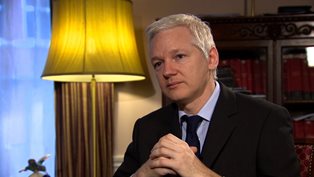 (CNN) -- Ecuador could make a decision on the asylum request of WikiLeaks founder Julian Assange as early as this week, President Rafael Correa said.
(CNN) -- Ecuador could make a decision on the asylum request of WikiLeaks founder Julian Assange as early as this week, President Rafael Correa said.
Assange has been holed up inside the Ecuadorian Embassy in London since petitioning for asylum on June 19. He is seeking to avoid being sent to Sweden over claims of rape and sexual molestation and said he fears if he is extradited there, Swedish authorities could hand him over to the United States.
The decision process has taken nearly two months because of the complexities of the case, the Ecuadorian leader said in an interview on state television Monday night.
"It has to be addressed with great responsibility," Correa said, referring to newspaper reports questioning the delay in accepting or denying Assange's request.
Correa explained: "The process in Sweden needs to be reviewed, you have to consider the possibility of extradition to the United States, if there's a secret tribunal there, if there's any risk of a death penalty. It requires a large amount of information, an analysis of international law to make an informed, absolutely responsible and sovereign decision."
All of the reports relating to the request have been completed, Correa said, and a statement on the matter could come as early as Wednesday, following a meeting on the subject.
Correa has said previously that capital punishment exists in the United States for a "political crime," and that fact could be sufficient grounds to grant Assange asylum.
Correa also has said he is not afraid of international repercussions that might stem from whatever decision Ecuador makes.
Assange was arrested in Britain in 2010 because Swedish authorities wanted to question him about the sexual molestation and rape allegations, which he denies. His bail conditions included staying every night at the home of a supporter outside London.
British police say he violated his bail by staying at the embassy. After he entered it, they served him with notice to turn himself in -- an order he ignored, marking a further violation.
Diplomatic protocol prevents police from entering the embassy to arrest him.
WikiLeaks, which facilitates the anonymous leaking of secret information, has published about 250,000 confidential U.S. diplomatic cables, causing embarrassment to the government and others. It also has published hundreds of thousands of classified U.S. documents relating to the conflicts in Iraq and Afghanistan.
Assange sought refuge at the embassy five days after the Supreme Court of the United Kingdom dismissed a bid to reopen his appeal of the decision to send him to Sweden, his last option in British courts.
British officials have met with Ecuadorian authorities, but no information has been released about those meetings.
CNN's Nelson Quinones contributed to this report.
Portland and Seattle
Free Subscription to Breaking News
Free Subscription to Breaking News






















































































































































































































































































































































